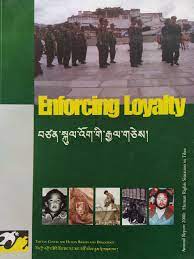A new “Re-education-through-Labour” (Ch:laojiao) camp has been established in Senge Township, Ngari County, Tibet Autonomous Region (“TAR”). The camp which will accommodate about two hundred inmates became functional in July 2004 when the construction work was completed.
According to Tibet Daily on 21 July 2004, “The “Re-education-through-Labour” camp located on the Fren Xin Highway on the 4300 Meter high Senge Township in Ngari County has now become functional. The Development Department invested eight million Yuan in building the new camp. The camp can hold two hundred inmates and is 40 thousand square feet in size. The 1760 Km distance between Lhasa City and Ngari is very long and is not secure in transporting people to the “Re-education-through-Labour” camp. The Tibet Autonomous Region (“TAR”) Law Enforcement Department, in an attempt to establish social stability in Ngari Prefecture and to improve the economic status of the Tibetans, have communicated to the concerned national department and in June 2003, the State Development Authority sanctioned eight million Yuan and work formally began on the “Re-education-through-Labour” camp in Ngari region. The newly established “Re-education-through-Labour” Camp will bring social stability in Ngari Prefecture.”

